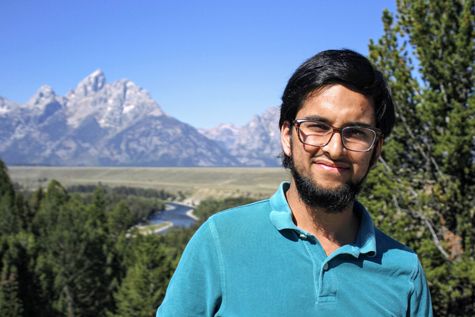Early Career Scientist Spotlight
Dr. Shahryar Khalique Ahmad (he/him/his)
Hydrologist
Hydrological Sciences Laboratory (617)
What is your research focus?
I study the Earth’s water resources, how they are changing, and the impacts of human footprint on these resources. Understanding the availability and movement of water through an ecosystem is the key to its sustainable management. My current research is part of a very exciting project that focuses on understanding the evolution and mechanism of hydrologic extremes, such as floods and droughts. I use hydrological models to study Earth processes that govern water cycle components such as rainfall, evapotranspiration, and soil moisture retention. An excess or deficit in any of these components contributes to extreme hydrological events, such as floods and droughts. The models are forced with various hydrometeorological fields and geophysical variables. Because of the complexities in representing real-world systems using mathematical models, remotely-sensed and ground-observed information is assimilated in the model to reduce noise and inconsistencies. NASA has a suite of satellite missions to provide this information, such as Integrated Multi-satellitE Retrievals for Global Precipitation Measurement (IMERG) for precipitation, Soil Moisture Active Passive (SMAP) for soil moisture, Moderate Resolution Imaging Spectroradiometer (MODIS) for vegetation conditions, and Gravity Recovery and Climate Experiment (GRACE) for terrestrial water storage. Combining information from different sensors with ground measurements can characterize the physical mechanisms and impacts of extreme events using the outputs from land surface models, and thus aide the early warning and mitigation efforts.
Along similar lines, my doctoral research focused on dam operations which form another significant aspect of the human footprint on the water cycle. With the goal of scientifically intelligent and environmentally responsible operation and management of dams, I used earth observation data and numerical weather prediction (NWP) forecasts to address the water-energy nexus for dams across the globe. Using multi-objective optimization and data-driven forecasting, I demonstrated a proof-of-concept for utilizing fewer dams while gaining more power and better ecosystem outcomes to lead us towards a smart and resilient water resources management system.
In making research user-ready, the last mile is just as important as the first mile. Part of my research efforts are also directed toward addressing the open science paradigm and promoting the science outreach by actively engaging with stakeholders and water managers. I hope to be actively involved in open science initiatives at NASA that further the science outreach to the masses.
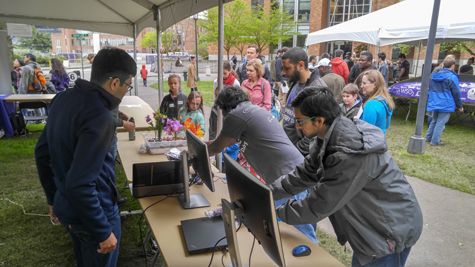
Credit: UW Civil and Environmental Engineering Department
What motivated you to pursue a career in hydrology?
My fascination with hydrology stemmed from my curiosity about the airplanes that I could see from my rooftop in my early childhood. I kept wondering how our planet appears from those tiny looking objects flying above the clouds. This curiosity was finally sated when I flew to Burnaby, British Columbia, for my internship at Simon Fraser University where I worked on estimating water depths in Canadian lakes using remote sensing during my junior year. That was the first time I was infected with the bug of scientific inquiry and research.
Ever since, I have been enthusiastic about solving societal problems using remote sensing. It was this addiction to make earth observation data serve human needs that drove me to join the Satellites, Sustainability, and Water (SASWE) group of Dr. Faisal Hossain at University of Washington, where I was introduced to the applications of hydrology research. My advisor’s passion was infectious, and he and other mentors inspired me to always think "out of the box." To that end, I shaped my doctoral research around improving the current state of water resources management and ended up pursuing my career in hydrology at NASA Goddard.
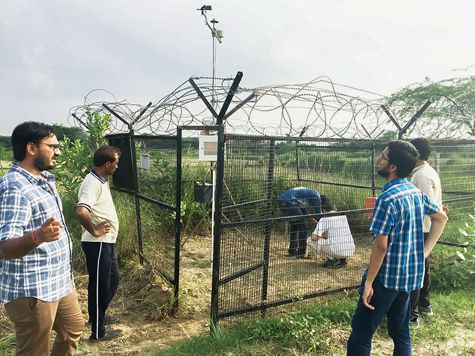
Credit: Dr. Faisal Hossain
How did you end up working at NASA Goddard?
I would have never believed that one day I would get to work at NASA, but that dream came to life in the summer of 2017. I was selected for summer research internship at Goddard’s Hydrological Sciences Lab, thanks to my advisor Dr. Faisal Hossain’s guidance and support. I was fortunate to be mentored by Dr. Sujay V. Kumar during the internship where I co-developed a prototype for the NASA-USAID Famine Early Warning Systems Network (FEWS NET) project over Central Asia and Africa to monitor the snow conditions and water availability. This internship gave me first-hand experience of what it’s like to work in a national laboratory on some of the existential on-ground issues to benefit the masses.
The passion to contribute to NASA missions further increased when I got another opportunity to work on a project with Dr. Sujay Kumar during summer 2020. I explored a robust machine learning algorithm to identify flood-affected areas using real-time microwave remote sensing products. From these two internships during my graduate school, I learned a lot about NASA and established connections with different scientists that led me to NASA Goddard.
Who inspires you?
Most importantly, my parents and sister have been the inspiration and source of light at every step of my life. My father has always instilled in me the confidence and zeal to aim for the highest of goals and to keep courage when things are not going as expected, because the life is much bigger than that. He has taught me to strive in doing good to others, which is a gem to me and a catalyst for moving forward with the pursuit of excellence.
I’ve also been blessed with several mentors and friends who have shaped me along the way. My PhD advisor Dr. Faisal Hossain has been more than just an academic advisor. He has not only helped me grow academically and intellectually, but he also continues to fuel me through his passion to serve humanity. Another key source of inspiration is learning and reading about great people in the past and pioneering scientists who have paved the path forward.
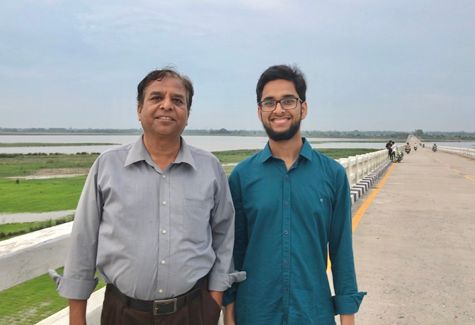
Credit: Dr. Shazia Durdana
What is one space mission that you are particularly excited about, and why?
The upcoming Surface Water and Ocean Topography (SWOT) mission intrigues me quite a bit. Monitoring lakes and reservoirs, which are critical sources of Earth’s freshwater, has been particularly challenging due to issues with temporal and spatial coverage of the existing remote sensing products and the dearth of ground measurements, especially in developing world. What makes this mission even more exciting is my previous involvement with the SWOT Applications Working Group and Early Adopter Program, led by my PhD advisor. I supported the SWOT Early Adopters during the SWOT Hackathon organized at University of Washington in 2019 and 2020.
This mission will be instrumental in providing unprecedented measurements of water surface elevation over a much wider swath and at a much finer resolution and accuracy compared to existing altimeters. Simultaneous observations of water levels and area will also allow volume storage estimation at a fine spatiotemporal resolution which is particularly useful for understanding the water availability and movement of water through the ecosystem.
What do you like to do in your free time?
I am a nature lover and like to explore new places every now and then. Taking excursions to new places, meeting different people, and learning from their stories and experiences always captivates me. You might also find me playing cricket or tennis or on a hike. Apart from outdoor activities, I am very passionate about web development and designing, which allows me to unleash the artist in me (checkout my github.io here)!
I also love nature photography and spreading science through filmmaking. I co-created a promotional film for our research group at University of Washington with the motive of spreading the science to the masses. The film won the ‘Public Messaging and Engagement Award’ at the 2nd UW Student Film Contest.
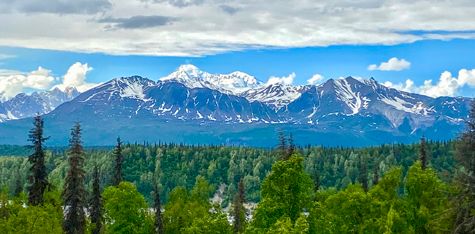
Credit: Syed Faisal
What keeps you inspired by your work?
Seeing the real-life applications of research to solve existential human and societal problems is a great source of motivation. I am enamored by the notion of user-ready research – one that not only lives inside publications but also reaches the masses who are in need of the science and its applications… and that’s worth putting in all the effort!
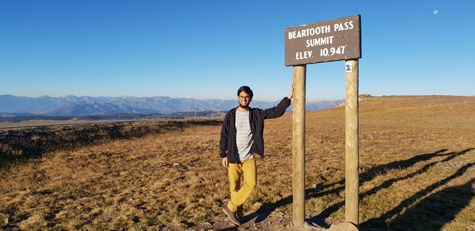
Credit: Mohammed Abdul Kareem
What advice would you give your younger self?
Aim high and stay the course!
Research is made of ups and downs but staying the course will get you through any hurdle whatsoever. Connect with colleagues and scientists around you, learn from their experiences, and seek advice from your mentors. Don’t shy away from collaborating on different projects.
Aspiring scientists should not be afraid to try things out and potentially fail, because failure exposes holes in the walls and helps identify the weaknesses. Find what you are passionate about, put your best in it, and keep expanding your horizons!
Biography
Home Town:
Aligarh, India
Undergraduate Degree:
Bachelor of Technology in Civil Engineering, Indian Institute of Technology, Kanpur, India
Post-graduate Degrees:
M.S. in Civil Engineering, University of Washington, Seattle, WA
Ph.D. in Civil Engineering, University of Washington, Seattle, WA
